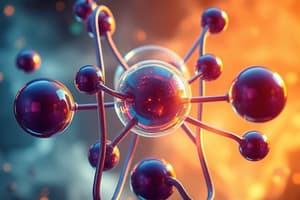Podcast
Questions and Answers
What are the four main states of matter?
What are the four main states of matter?
- Solid, Liquid, Gas, Plasma (correct)
- Metal, Wood, Plastic, Rock
- Hot, Cold, Neutral, Radioactive
- Proton, Neutron, Electron, Atom
Which type of matter is hotter than any other?
Which type of matter is hotter than any other?
- Liquid
- Plasma (correct)
- Gas
- Solid
What is the charge of protons?
What is the charge of protons?
- No charge
- Variable charge
- Negatively charged
- Positively charged (correct)
What happens when a substance gains heat energy?
What happens when a substance gains heat energy?
What is the fifth state of matter discovered by scientists?
What is the fifth state of matter discovered by scientists?
Flashcards are hidden until you start studying
Study Notes
Matter is all around us—it's what makes up everything you can see, touch, taste, hear, and smell. It's also invisible most of the time. Atoms make up matter. There are billions of atoms in every tiny bit of it! Some matter is solid, like rocks, metals, and some plastics. Other stuff is liquid, like water, oil, and mercury. Even more stuff is gas, like air, helium, and natural gas. But there aren't just three types of matter. Another kind of matter is called plasma. Plasma is hotter than any other type of matter. In fact, the temperature inside a star is so high that its matter becomes plasma.
Matter has many parts, too. Each part is made from atoms, which have different numbers of protons, neutrons, and electrons. Protons are positively charged, while neutrons don't have a charge at all. Electrons are negatively charged, but they travel very quickly and easily through space.
There are four main states of matter: Solid, Liquid, Gas, and Plasma. A substance can change state by gaining or losing heat energy. This happens when something gets warmer or cooler. For example, when ice melts and turns into water, it gains heat energy, changing its state. When water boils and changes into steam, it loses energy, becoming gaseous. Similarly, if we take away enough heat from a piece of iron, it will become brittle and break apart, showing that it was solid before being heated.
In addition to these basic states of matter, scientists have discovered a fifth state: Bose-Einstein Condensate. This rare form is created only under extremely cold conditions, such as those found deep in outer space in places like Jupiter's Ganymede moon. If conditions are just right, certain molecules in this environment can freeze together and create a new type of matter. When normal temperatures return, the condensed material reverts back to its original state.
Studying That Suits You
Use AI to generate personalized quizzes and flashcards to suit your learning preferences.




